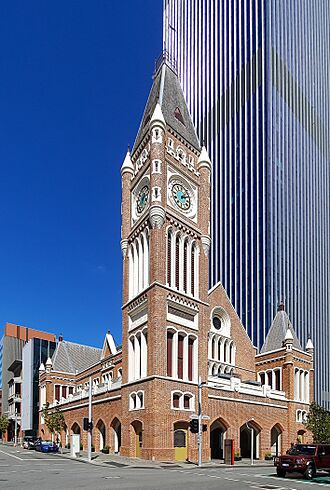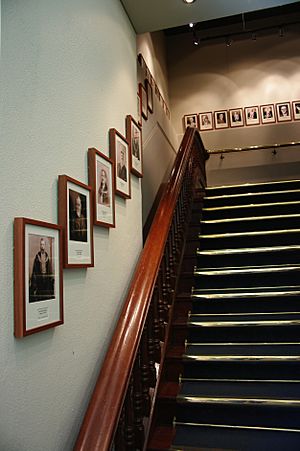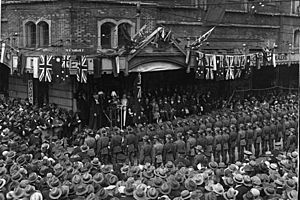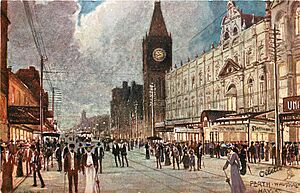Perth Town Hall facts for kids
Quick facts for kids Perth Town Hall |
|
|---|---|
 |
|
| General information | |
| Type | Town hall |
| Architectural style | Victorian Free Gothic |
| Location | Corner of Hay Street and Barrack Street |
| Town or city | Perth |
| Coordinates | 31°57′18″S 115°51′38″E / 31.955°S 115.860556°E |
| Current tenants | City of Perth |
| Groundbreaking | 24 May 1867 |
| Completed | 1870 |
| Owner | City of Perth |
| Design and construction | |
| Architect | Richard Roach Jewell & James Manning |
| Type | State Registered Place |
| Designated | 23 May 1995 |
| Reference no. | 1953 |
The Perth Town Hall is a famous building in Perth, Western Australia. It stands at the corner of Hay and Barrack streets. This town hall is special because it is the only one in Australia built by convicts. When it was finished, it was the tallest building in Perth.
Contents
Building History
How it Was Built
The Perth Town Hall was designed by two architects, Richard Roach Jewell and James Manning. They used a style called Victorian Free Gothic. This means it has many features like old European castles and churches.
The building was constructed between 1867 and 1870. Both convicts and free workers helped build it. You can even find special decorations that remind us of the convicts who worked there. For example, some windows are shaped like a "broad arrow," which was a symbol used on convict property.

Laying the Foundation Stone
The first stone for the Town Hall was placed on 24 May 1867. Governor Hampton led a big ceremony for this event. Even though it rained a lot, the celebration continued! There was a parade from Government House and a pretend battle by soldiers.
Centenary Celebrations
In 1929, Western Australia celebrated its 100th birthday. As part of the celebrations, a special plaque was placed on the Town Hall. Governor William Campion added this plaque to the building's northwest corner.
Changes Over Time
For many years in the 1900s, there were shops on the ground floor of the Town Hall. These included a pharmacy and a bank. There were also public restrooms that people could use. Before the building was renovated, all these shops and structures were removed.
In 1970, when the Town Hall turned 100 years old, the ground floor still had many businesses.
Modern Restoration
In the late 1990s, the Town Hall underwent a big restoration project. This project won awards for repairing the inside of the hall. It also fixed the beautiful gothic arches at the bottom of the building. These arches had been changed in the mid-1900s to look more modern.



